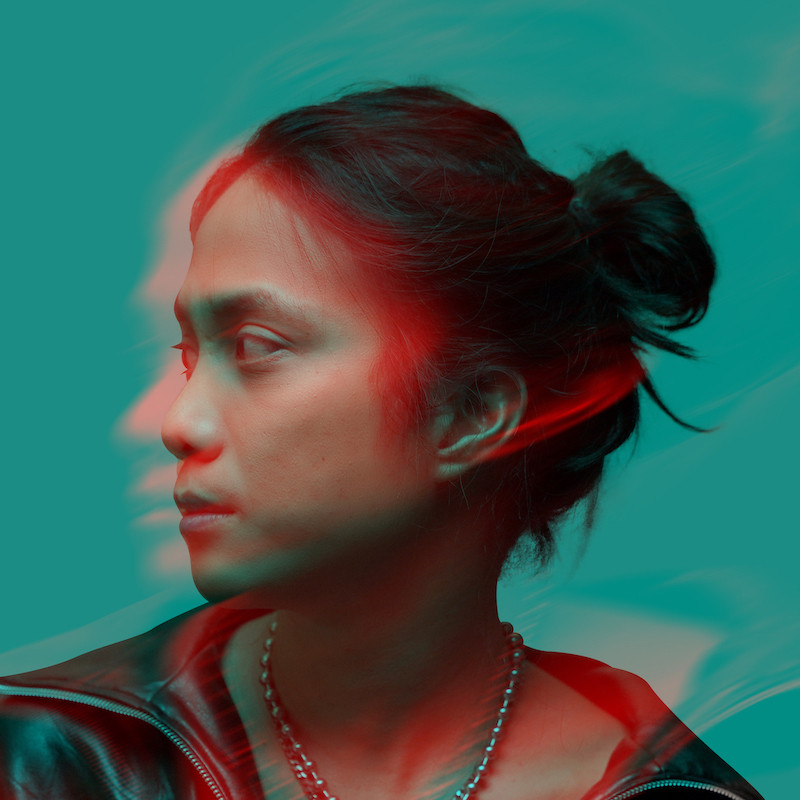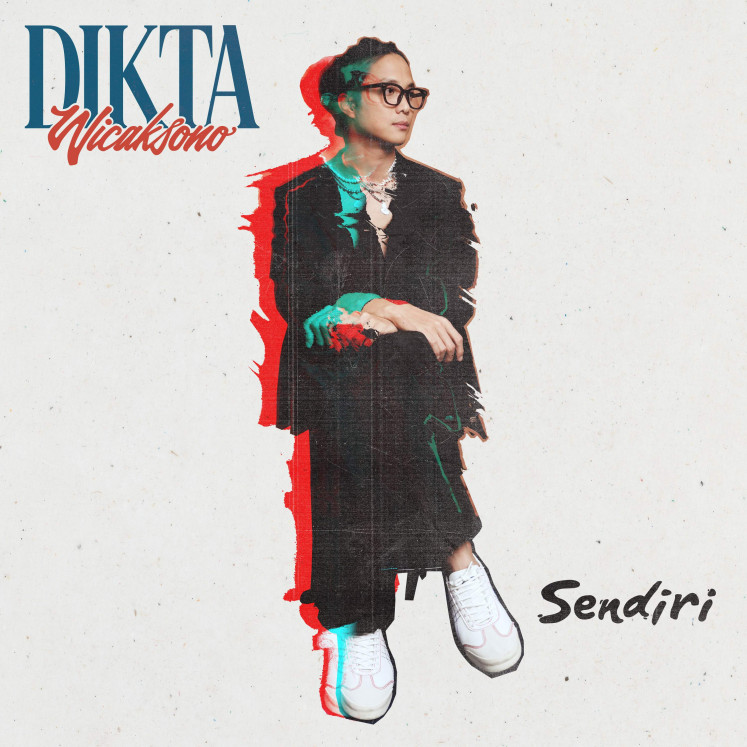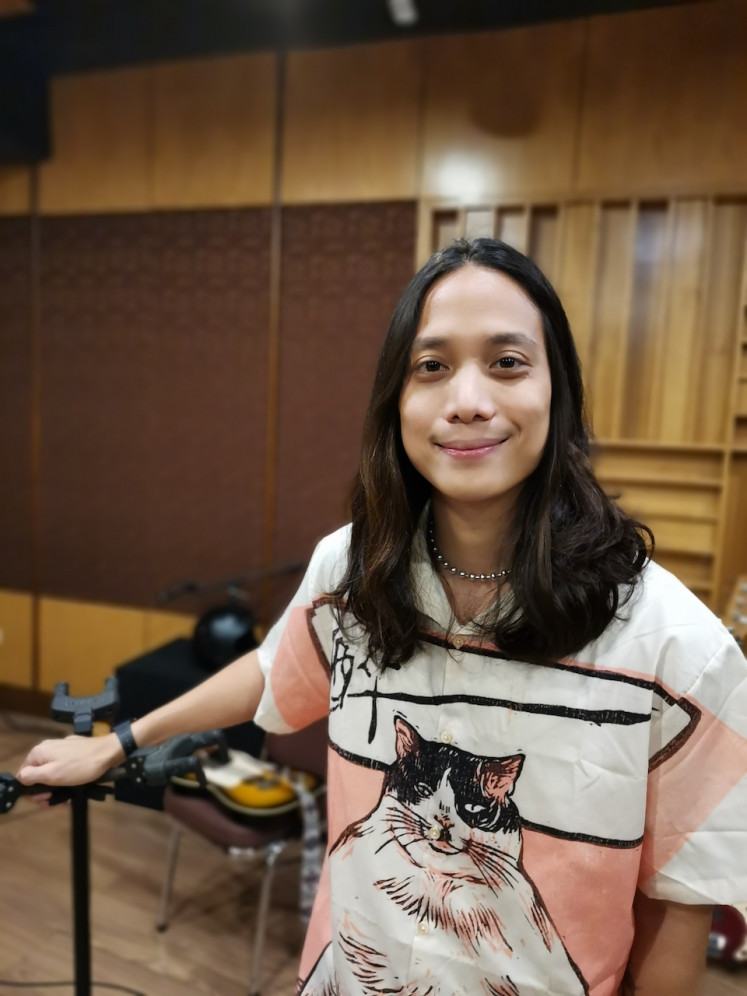'Subject to evolution': Dikta Wicaksono on debut solo EP
With the release of his debut solo EP Sendiri, the former co-vocalist of Yovie & Nuno claims his creative identity, self-reliance and individualism.
Change text size
Gift Premium Articles
to Anyone

W
ith the release of his debut solo EP Sendiri, the former co-vocalist of Yovie & Nuno claims his creative identity, self-reliance and individualism.
Departing a prolific band for a solo career could take time to navigate. In the case of Dikta Wicaksono, however, such a creative metamorphosis was manageable and, as it turned out, rather overdue.
Dikta’s debut solo extended play (EP) Sendiri (On my own), released on streaming platforms on Oct. 14, could be sized up as an amalgamation of the soloist’s influential past as a co-vocalist of pop band Yovie & Nuno, produced by Yovie Widianto, and his freethinking future as a standalone musician. The 36-year-old told The Jakarta Post and his prospective audience that Sendiri was not a reintroduction.
“I don’t believe in anything, like, ‘the real me’ or ‘the real you’. There’s no such thing. Everything changes. What if I made a keroncong record next? What are you going to do?” he teased, referring to the traditional music genre.
“Now is my chance to go solo and make records on my own. So I do what I like, the things I’ve wanted to do for a long time.”

Relative good
Dikta’s latest chapter began in June this year, when he announced on Instagram that he had decided to leave Yovie & Nuno after 15 years serving the band as its co-vocalist.
Looking back, the Jakarta native still believes he chose the right course for his career.
“I accomplished so much during those 15 years,” he reminisced. “I also tried acting, and this and that. Eventually during the pandemic, I decided that I’d like to try something new: going solo. That had been on my mind for quite some time, but it had never come to fruition.”
Audiences familiar with Dikta’s work with Yovie & Nuno might have found the announcement to be a bombshell, to a large extent because the band had become one of the primary staples in the Indonesian music industry. For instance, the band’s 2007 studio album The Special One received an Anugerah Musik Indonesia (AMI) Award for Best of the Best Album.
Nonetheless, Dikta believed that Yovie & Nuno would still move forward without him, taking the broader perspective that “good things are relative”.
“Everyone might deplore my decision to leave, but the thing is, one’s happiness cannot be measured by, like, ‘Oh, you’ve already won this and that!’” he remarked.
“As human beings, we are subject to evolution. Also, I happen to be the type who wants to [have] it all. When I believe it’s enough, it’ll be enough.”
Starting the next chapter in his musical career as a soloist might seem like natural progression for Dikta. Still, the music landscape had changed considerably since his initial debut in 2007. Now in his mid-30s, there was no guarantee that he would not have to compete with newer, younger acts.
Be that as it may, Dikta indicated he had no such concerns, except one.
“I’m only concerned that my music will end up being annoying. Have you ever listened to a song and you’re like, ‘What the heck is this song? So irritating!’” he said, adding that he never wanted to release a dud like that.
“What matters is only that I’m happy performing my songs and people are happy watching me perform.”
‘However I like’
Dikta released Sendiri under his own label, Yteam Records, and the title of the mini album also reflects his latest venture as both a soloist and a producer. He produced the entire EP, which credits him as the sole writer for five of its six tracks, with the closing number “Gagal Disekolah” (Flunking at school) being the one exception.
“When I was in Yovie & Nuno, Yovie was the one who composed all of the songs. I was delivering the vocal. That was it. Many bands, though, do things together from the get-go. Also, from the start, I was a late hire. Yovie & Nuno was first formed in 2001, whereas I joined the band in 2007. The feeling was different,” he said, explaining the difference between creating music as an individual and as part of a band.
“As a soloist, I do everything by myself. Ultimately, it comes down to the same thing, the purpose of which is, nonetheless, to make good music.”
In retrospect, Dikta said transitioning into a soloist was “odd at first”, though he eventually got the hang of it.
“I was like a kid being spoon-fed with delicious meals constantly” during the Yovie & Nuno years, he analogized. “Yovie’s songs were certainly amazing. But now? I have to cook for myself.”
Another challenge of DIY music was that he didn’t have other musicians who could be a sounding board for exchanging ideas and brainstorming. Still, he learned to shrug it off, opining that “music should have no quality control”.
“If we’re talking quality control, we’re also talking about the result. When you’re like that, that means you’re oriented toward commercialism. And when that’s your orientation, the result will not be genuine,” he said.
Dikta also believes there is always room for all kinds of music, mainstream-leaning or not.
“There’s no music that is without its listener. No matter how terrible the music is, there will always be someone out there who listens to it and likes it,” he asserted.
With that mindset, Dikta decided to avoid putting either his musical identity or solo EP into any genre-specific box – unlike Yovie & Nuno, whose body of work is easily defined as pop music.
“I don’t like my music being boxed [genre-wise]. I will make and perform music however I like,” he asserted.

Failure for success
Dikta’s open-minded approach is perhaps best manifested in “Gagal Disekolah”, a funk, up-tempo number in which he jovially reflects on his struggles at school. Over boastful horns and electronic organs, he croons: “Tapi kini semua telah musnah/Karena aku gagal di sekolah/Menyesal tiada guna/Semua pelajaran telah lupa” (Everything’s gone now/Because I failed school/Regret has no use/All lessons are forgotten).
He later divulged that “Gagal Disekolah” was a reworking of an original composition by his late father.
“That’s my dad’s story, but it’s also my story because I flunked at school as well,” he chuckled.
Dikta’s affinity for the blues, funk and swing takes shape in the more upbeat “Dia Tak Mau” (She’s not interested) and “Tunggu Aku” (Wait for me). The former recounts the singer’s failure in wooing his love interest, while the latter is a plea to his partner to stay.
“I’ve listened to [blues and funk] since I was a kid. The notations lit up the passion in me!” he enthused, adding that funk acts like The Meters, Tower of Powerm and Earth, Wind & Fire were some of his favorites.
Dikta’s latest solo venture does not mean he has entirely cleared his slate. The orchestral pop ballad “Cinta Tak Pada Waktunya” (Love at the wrong time) is an original composition he had thought of pitching to his former band.
“The [song’s] guitar and percussion vibe echoes Yovie & Nuno, though I was the one doing the bass,” he added.
Post-Sendiri, it seems Dikta will have a lot to juggle. Besides taking the EP to a live stage, he is keen on continuing his blues and funk-focused lounge music project, The Greytown Brothers, as well as his side job as an actor. In July, his most recent acting project, web series Indonesia Biner produced by Salman Aristo, premiered on local video-on-demand platform MAXstream.
So how does Dikta plan on wearing his many different hats in the future?
“I’m down with doing everything, as long as I’m still up for it,” he quipped.
Sendiri by Dikta Wicaksono is available to stream on Apple Music, Deezer, Spotify and YouTube Music.









